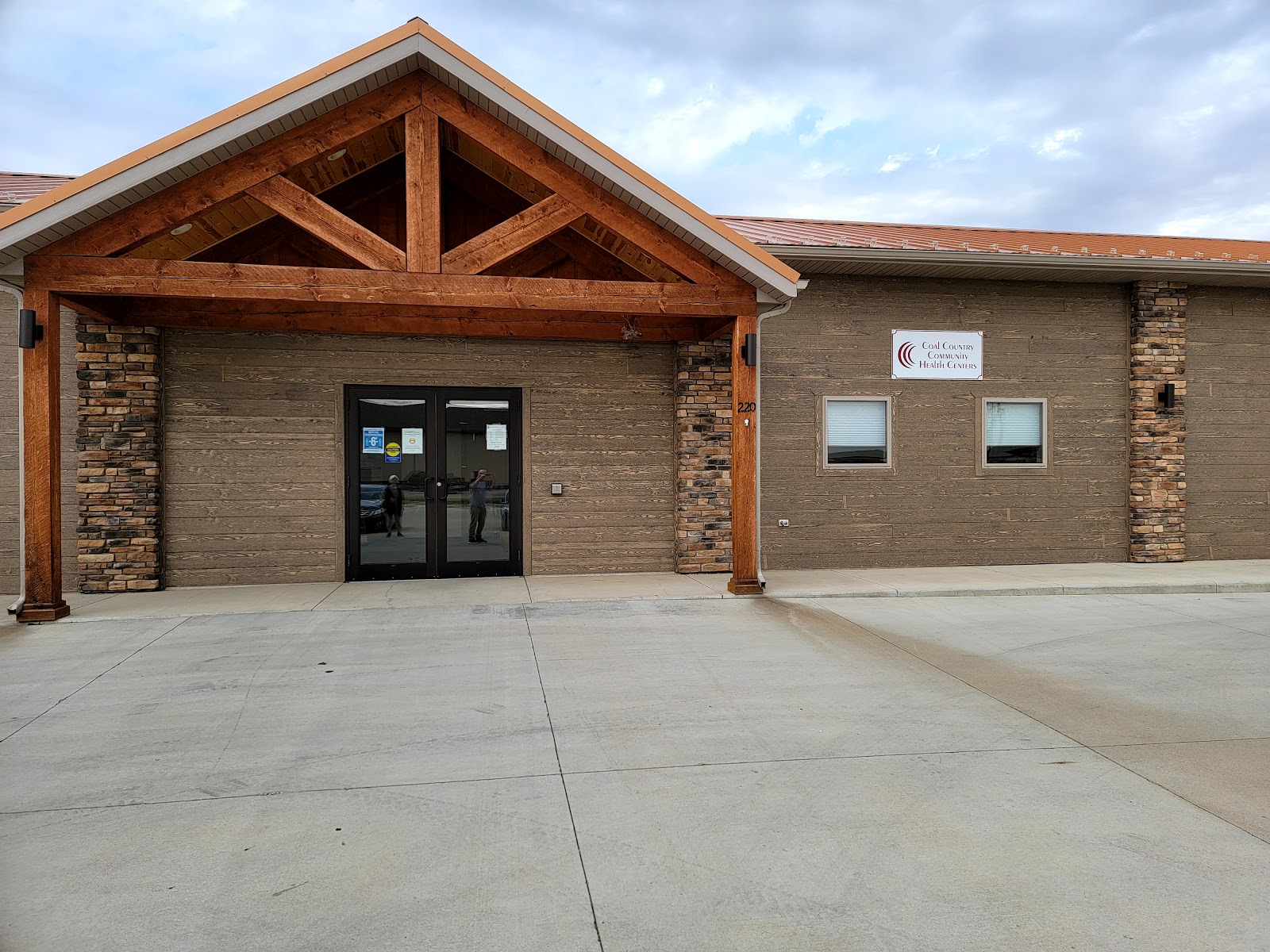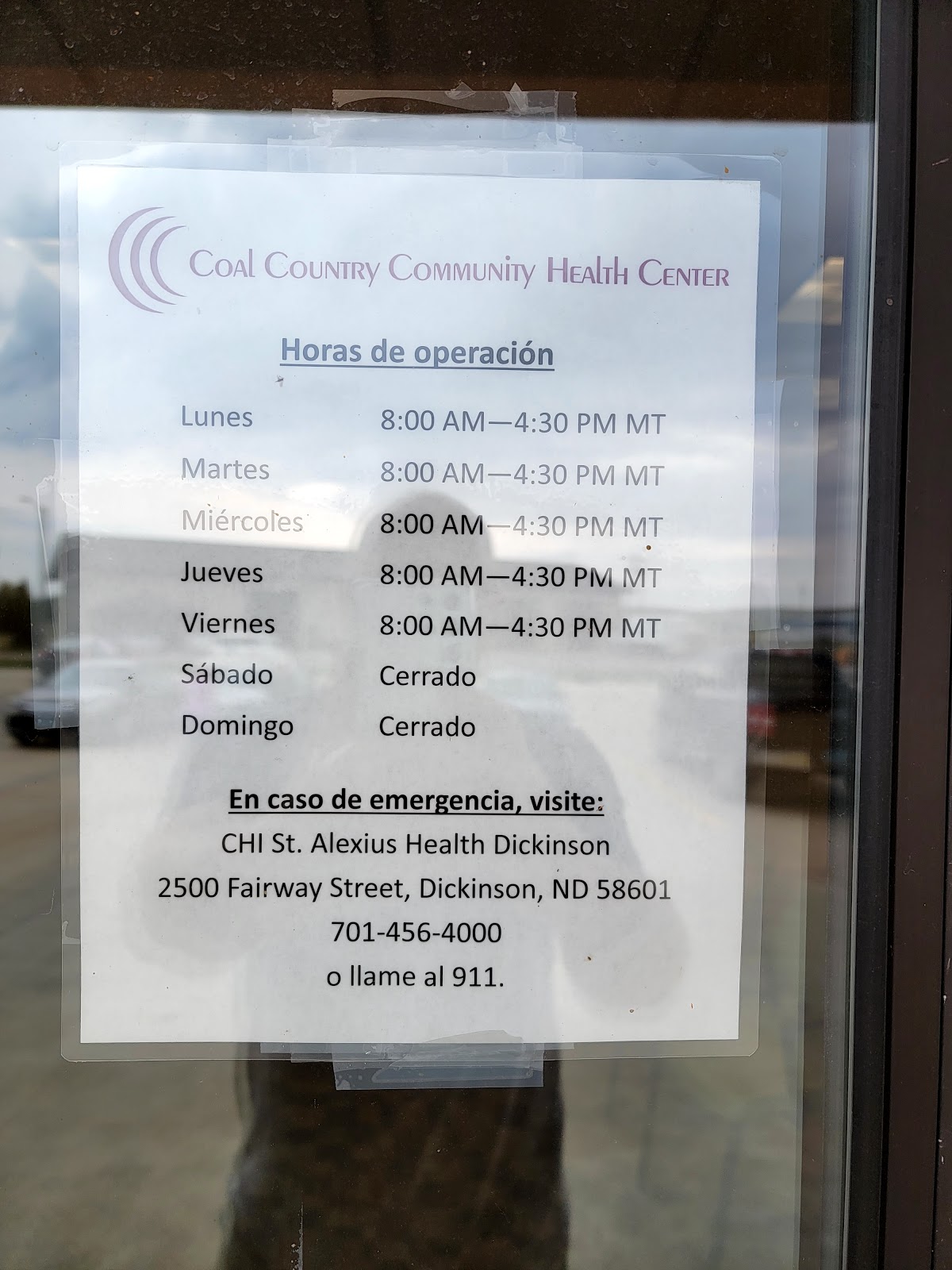Coal Country Community Health Centers
Overview
Coal Country Community Health Centers is an substance abuse treatment center that provides outpatient detoxification, for men and women from 18+ years of age. As part of their special programs, Coal Country Community Health Centers To help patients achieve sobriety, Coal Country Community Health Centers provides intake assessments. Afterward, patients receive group counseling and family counseling. during treatment. Coal Country Community Health Centers is located in Killdeer, North Dakota, providing treatment for people in Dunn County, accepting medicaid, private health insurance, and cash or self-payment.
Coal Country Community Health Centers at a Glance
Payment Options
- Medicaid
- Private health insurance
- Cash or self-payment
- State-financed health insurance plan other than Medicaid
- Sliding fee scale (fee is based on income and other factors)
Assessments
- Comprehensive mental health assessment
- Comprehensive substance use assessment
Age Groups
- Adults
- Children/adolescents
- Young adults
Operation
- State government
Treatment At Coal Country Community Health Centers

Conditions Treated
Mental health treatment:
Mental health facilities offer a safe space for individuals to get specialized care. Trained experts create personal plans using therapies, possibly including medication. The goal is to help individuals cope better and lead fulfilling lives, with constant support and a community feel.
Alcoholism:
Alcohol addiction is a condition where someone feels a strong and uncontrollable urge to drink alcohol, often leading to negative effects on their health, relationships, and daily life. To assist individuals grappling with alcohol addiction, various strategies exist. Initially, supervised detoxification may be necessary to ensure a safe cessation of alcohol consumption. Following this, counseling and therapy play a crucial role in addressing the psychological facets of the addiction. Engaging in support groups can also offer a sense of camaraderie and comprehension.
Opioid Addiction:
Opioid rehabs specialize in supporting those recovering from opioid addiction. They treat those suffering from addiction to illegal opioids like heroin, as well as prescription drugs like oxycodone. These centers typically combine both physical as well as mental and emotional support to help stop addiction. Physical support often includes medical detox and subsequent medical support (including medication), and mental support includes in-depth therapy to address the underlying causes of addiction.
Substance use treatment:
Substance abuse treatment programs can help to address addiction and, if relevant, any co-occurring mental health conditions. Programs include outpatient, inpatient, dual-diagnosis, and partial hospitalization. The addict will receive therapies like cognitive behavioral therapy, or dialectical behavioral therapy, and sometimes complementary therapies like acupuncture and mindfulness-based therapy. By attending skills training and recovery groups you’ll build a strong foundation for your recovery and strengthen your support network, increasing your chances of long-term recovery success.
Co-occurring Disorders:
Dual-diagnosis rehabs are usually the appropriate solution to treat co-occurring mental health and substance abuse disorders. These facilities typically employ medical and behavioral experts who use a range of interventions, together with the right healing environment, for you to achieve and sustain long-term recovery. Treatment usually includes evidence-based therapies (like cognitive behavioral therapy), recovery support meetings, 12-step facilitation, psychoeducation, skills training, and group therapy.

Levels Of Care
Detoxification:
Detoxification (detox) is the process of clearing the body of drugs or alcohol that an individual has consumed. The purpose of detox is to safely manage withdrawal symptoms when someone stops taking drugs or alcohol. It denotes a clearing of toxins from the body of the patient who is acutely intoxicated and/or dependent on substances of abuse. Detoxification seeks to minimize the physical harm caused by the abuse of substances.
Aftercare:
Aftercare refers to the structured support and programs offered to individuals after completing an initial treatment phase for substance abuse or other disorders. Recognizing that recovery is an ongoing process, aftercare provides continued counseling, skill-building, group therapy, and resources to help individuals maintain sobriety, manage triggers, and reintegrate into daily life, reducing the risk of relapse and ensuring long-term success in recovery.
Outpatient:
Outpatient treatment in a rehab center offers structured therapeutic services for individuals seeking recovery without full-time residential admission. Unlike intensive outpatient programs, which demand more frequent and longer sessions, standard outpatient care provides a more flexible approach, allowing participants to maintain daily activities and responsibilities while undergoing treatment.

Treatment Modalities
Group counseling:
Group therapy entails therapeutic sessions conducted in a collective setting rather than one-on-one. It encompasses various modalities, from support groups and experiential therapy to psycho-education and beyond. The approach focuses on treatment and emphasizes the dynamic interactions and shared experiences among group members.
Family counseling:
Family Counseling is a therapeutic approach that seeks to address and improve communication, understanding, and dynamics within a family unit. By addressing conflicts, emotional distress, and behavioral challenges, a trained therapist provides guidance and tools for family members to strengthen bonds, resolve issues, and foster a healthier family environment.

Additional Locations
Contact Information
DISCLAIMER: The facility name, logo and brand are the property and registered trademarks of Coal Country Community Health Centers, and are being used for identification and informational purposes only. Use of these names, logos and brands shall not imply endorsement. BetterAddictionCare.com is not affiliated with or sponsored by Coal Country Community Health Centers.



